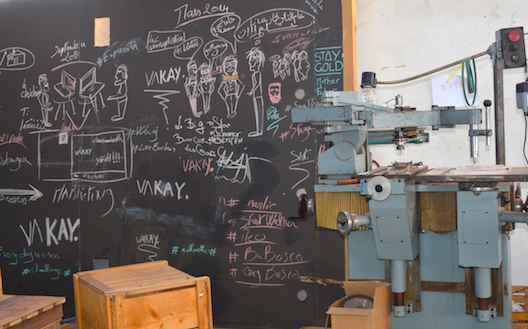From Tunisia to Barcelona FC, the Vakay sunglasses are getting traction


Adam Jabeur, cofounder of Vakay. (Images via Christine
Petré)
“It started as a joke,” explains Adam Jabeur when we meet in Le Lac, a Tunis suburb. The trendy businessman pictured above, dressed in skinny jeans, white shirt, striped tie, a grey jacket and a pair of Vakay, describes how he one day, back in 2013, was intrigued by a pair of wooden glasses online. He immediately went to his designer friend Soulaiman Ghorbel and two months later a prototype was finished. “At first our friends laughed at us,” explains Jabeur, “but when they saw the result they fell in love,” he says proudly.
The two young guys decided to create sunglasses for their friends in order to make some pocket money, but when an optician, whom they had consulted for technical advice, became more than enthusiastic about the eyewear, “it was the aha moment,” says Jabeur, “We just realised that we need to go for this.”
Today, Jabeur and Ghorbel have been joined by two more partners, Majdi Ghorbel an engineer and Ashref Chichini, a designer. Today the brand is sold in Tunisia and France through opticians and concept stores. “We are the only sunglasses company in Tunisia,” explains Jabeur.
A learning process

Not your usual workshop.
The first year at the work-shop, a quirky factory space with chalk board messages on the walls, in Sfax, where three of the men grew up together, was a thorough process of developing the production process in detail.
In the beginning one challenge was how to fund some of the expensive machines and at the same time find the right material, remembers Jabeur. He is certain that the team’s different connections, relationships and competence, were key to success.
One important question the team was facing for example was which wood to use. Today the customer can chose between five different types of wood including zebrawood and bubinga. But it was a time consuming and tricky process. “We noticed in the beginning that some models just didn’t work, aesthetically and practically,” Jabeur explains. To choose the type of wood the team looked among other things at the aesthetic aspect and followed their gut, he says, “but no wonder it took us a year before the official launch, 8 march 2014.”
Today the production process continues to evolve and the team has modified existing machines to meet their needs. They have also invested in a new machine for one part of the production chain.
“This year we are hoping to reach markets such as Morocco, UK, Germany and Italy,” explains Jabeur. But with faster growth comes also greater complexities, keeping the superior quality at the same time as increasing productivity is essential. “If you claim to produce a high end product you need to have the quality to back it up.”

The Vakay glasses in production.
"5,000 pairs in one month, of the same quality,” he says, “but we need to learn how to handle the orders despite our limited production capacity.” Now there are two full-time employees and the team is hoping to expand to a total of 10 people this year. In five years, he is hoping that the company will be among the best wooden sunglasses companies in the world.
A bold marketing startegy
“Everyone can have a Vakay,” says Jabeur, teenagers and businessmen alike. Or at least anyone who is ready to pay between 400-700 Tunisian dinars ($200-350 USD), for any of the 10 new models from three different collections, including, for example, the Streetwalker, Linebacker, Charlie and Ba Bosco.
Most of the promotion is done through social media channels such as Instagram and Facebook. Another PR strategy the team is adopting is getting stars to sport the Vakay. FC Barcelona's Dani Alves was seen wearing a pair of Linebacker's after a friend of a Vakay’s offered him a model, which created buzz, says Jabeur. “It was very cool,” explains an excited Jabeur, “some of my friends were sure it was photoshopped when they saw the photos.”
Sometimes Jabeur wears the sunglasses without its glass to attract attention. “It makes people curious, they ask about it and then I begin telling them about Vakay,” he explains with a big smile. Jabeur's current sunglasses are one of his favorites, philosophical is how he would describe them: “We might even change the model’s name to Freud,” he says and laughs, “you need to be unafraid to wear it.”

The final result.
Every weekend Soulaimen comes with a new idea, says Jabeur enthusiastically. One of the limited editions is Mr Miles, a model of zebrawood and oak, with a polarised lens and the logo “Save Mos Espa” laser etched on the branch. The idea behind the model was to contribute to raising money to "Save Mos Espa" a fundraising campaign to protect and restore the set of the science fiction movie Star Wars in the south of Tunisia. The team is also donating sunglasses to those who contribute with more than $400 to the initiative. “Tataouine is an important place, not just because it’s a tourist attraction but also because we really like Star Wars,” he says and smiles.
“We also want to put Tunisia on the map,” explains Jabeur, “and show that we can produce high quality and design products.” The team is regularly attending entrepreneurship events where they speak to aspiring entrepreneurs and students. Their success is inspiring others, with some of their friends now beginning to consider opening their own businesses. “We are motivating them and they are motivating us,” says Jabeur.


